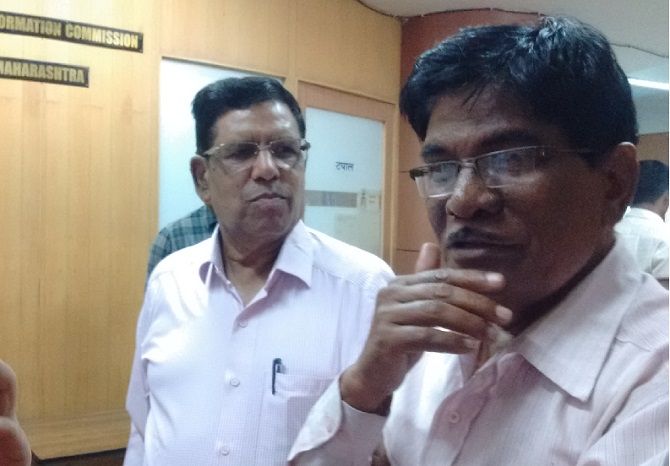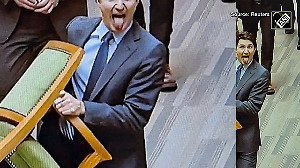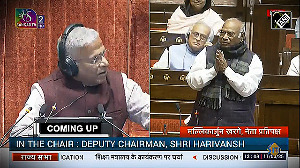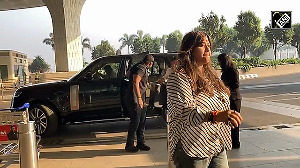Curiously, on one aspect -- the large turnout of Dalits at Bhima-Koregaon -- both the counsel for the government and police, and the counsel for Milind Ekbote, an accused in the Bhima-Koregaon violence, pursued the same line of questioning.
They asked Tukaram Gavare about the planning that must have gone behind this turnout.
Jyoti Punwani reports from the Bhima-Koregaon hearing.

Retired policeman Tukaram Gavare was one of the victims of the violence that broke out at Bhima-Koregaon on January 1, 2018.
In his affidavit filed before the Bhima-Koregaon Commission, the 70 year old described in detail how the bus in which he and members of the Dr Babasaheb Ambedkar Kalyankari Mandal, Thane, of which he is the president, was stoned by motorcyclists carrying saffron flags, shouting 'Jai Bhavani Jai Shivaji'.
Gavare was hurt by glass pieces when the bus was stoned.
The motorcyclists forced the occupants of the bus to get off and then burnt the bus.
The affidavit goes on to say that these men, 20 to 25 in number, abused Gavare and his companions thus: 'Hey Maharde faar maajlet, tyana khali khecha, tyancha maaj utarava (These Mahars have become too arrogant. Pull them out (of the bus), let's put an end to their arrogance).'
The affidavit criticises the role of the police.
The police knew a bandh had been declared in the villages near Bhima-Koregaon. They also knew people were to come in large numbers to Bhima-Koregaon.
Why didn't they take adequate precautions so that these people should be given food and water?
Why was there no bandobast there? By not doing this, the police have deliberately allowed a riot to take place, says Gavare's affidavit.
Gavare was cross-examined at length by Shishir Hiray, the counsel for the government and the police.
Making much of Gavare's 35 years experience as a policeman -- he rose from the ranks to assistant police inspector -- Hiray asked the retired cop a number of questions regarding police bandobast during processions.
Three key questions were:
- If any action is required to control a mob, does not the police take into consideration those constituting the mob/procession, whether women, old persons and children, are present in it? Isn't it true that even if there are two groups, the police must take into consideration the possible reaction of the rival group while taking action against one of them, so that minimum damage is done to life and property?
- Isn't it true that while determining the intensity of police action against one group, the police must assess the determination of the group and assess how much they will obey the police?
These questions assume significance given the criticism against police inaction made by the three witnesses who have deposed so far.
All three spoke of the police doing nothing while a riot-like situation prevailed in and around Bhima-Koregaon as they were abused, stoned and terrorised.
Hiray questioned Gavare on his inaction when a bandh was imposed by Dalits in his neighbourhood on January 2.
When Gavare and members of his mandal went to the police station in Thane to file a complaint about what had happened to them in Bhima-Koregaon, the policeman on duty there refused to take the complaint.
This angered some local youth who went around forcing shops in the area to close.
"Did you stop these youth from forcing the shops to close?" asked Hiray, to which Gavare replied that he remained inside the police station while this was going on.
Incidentally, in his affidavit, Gavare points out that even when later, the police did write down their complaint, they did not include two important details narrated by the victims: The caste abuse the latter faced and the loss caused by the burning of the bus.
Curiously, on one aspect -- the large turnout of Dalits at Bhima-Koregaon -- both Hiray, counsel for the government and police, and Niteen Pradhan, counsel for Milind Ekbote, an accused in the Bhima- Koregaon violence, pursued the same line of questioning.
They asked Gavare about the planning that must have gone behind this turnout.
However, Gavare gave the same answer to both: He knew nothing about any such planning.
Asked by Pradhan about meetings held in December 2017 to spread awareness, Gavare replied: "I do not know if there was any awareness campaign."
Asked by Hiray whether such "mass mobilisation" had to be planned by someone, Gavare replied, "It could be so. But I did not make any effort to mobilise people, and I do not know if anyone has mobilised people."
Interestingly, the detailed narration in Gavare's affidavit saw no questions being asked.
Though veteran lawyer B A Desai had taken another Dalit witness Tanaji Sable through his affidavit, he did not do the same this time with Gavare.
Though two lawyers were present for Gavare, neither of them thought fit to highlight the facts in Gavare's affidavit.
The only questions asked about Gavare's affidavit were by advocates who cross examined him.
Both Pradhan and Vijay Sawant, representing Ekbote and the Hindutva think-tank Vivek Vichar Manch respectively, pointed out to Gavare that his affidavit and that of the first witness Manisha Khopkar, were almost the same.
Khopkar had travelled in the same bus as Gavare.
Gavare admitted that he and his Mandal secretary had made a draft and then filled in the details of all those members who had travelled there.
Two applications were filed on Wednesday, September 26, before the two-member Bhima-Koregaon Commission of Inquiry headed by Justice J N Patel. Both have asked for the complete police records pertaining to the events preceding the violence at Bhima-Koregaon on Janaury 1.
The applications were filed by advocates Desai and Sandeep Dongre, on behalf of Congressman Sanjay Lakhe Patil and Gavare respectively.
Arguing that only police affidavits would not be enough, the applications ask for copies of station diary entries and wireless messages between the control room and police stations on January 1, 2018.
They also ask for all material relating to the police investigations carried out so far relating to that violence: Chargesheets filed if any, FIRs, statements of witnesses, panchnamas pertaining to the incidents of January 1.
Desai has also asked for the copies of the affidavits filed by the government in the Bombay high court and Supreme Court when Ekbote's anticipatory bail application was heard.
This material was essential to ascertain whether the police had done their duty that day or failed to control the situation -- one of the commission's terms of reference, the advocates told the Commission.
"Without these, the commission's proceedings would be meaningless," Desai told the commission.
Copies of the proceedings of the Maharashtra legislative council and assembly relating to Chief Minister Devendra Fadnavis's statements on Bhima-Koregaon on March 13 and 27 have also been asked for by Desai.
Hiray will file his reply to the applications.











 © 2025
© 2025